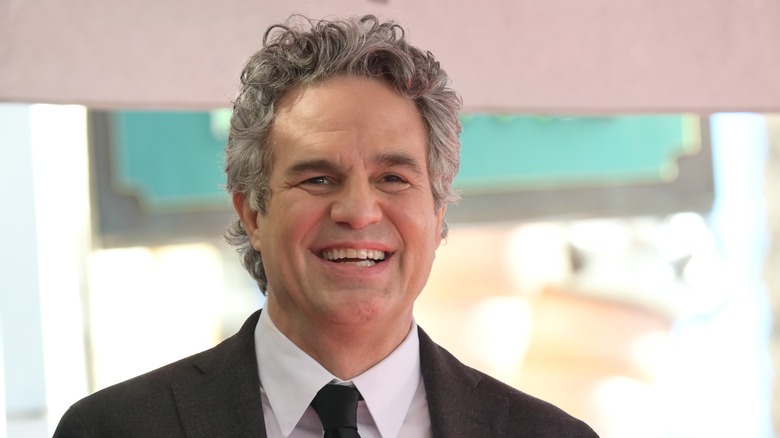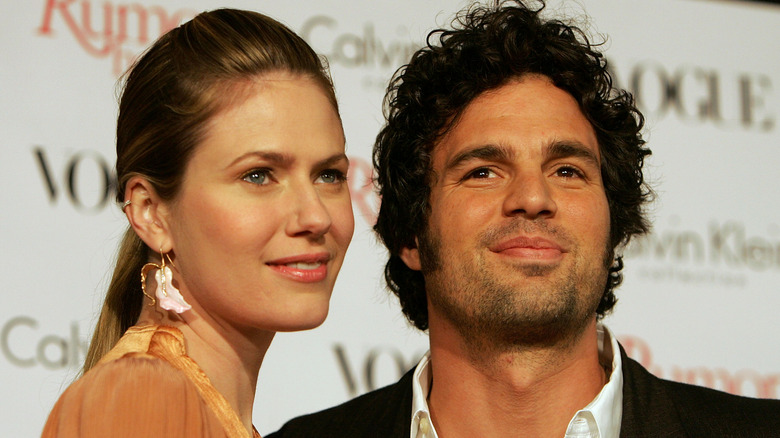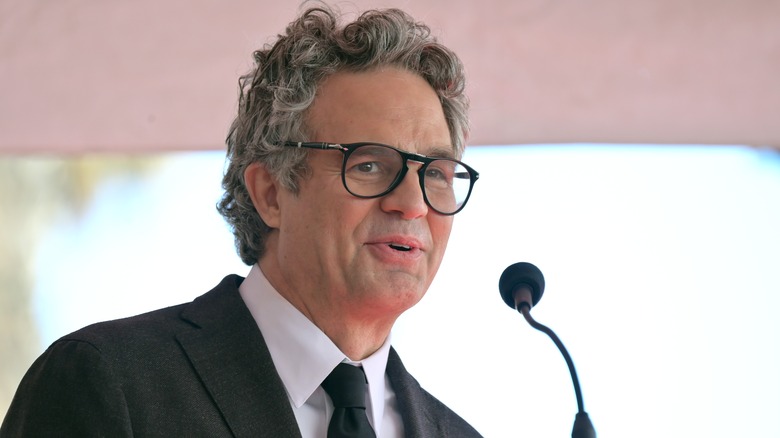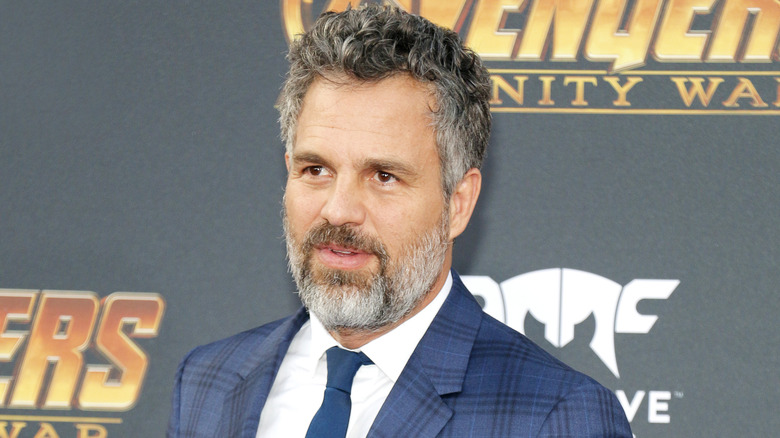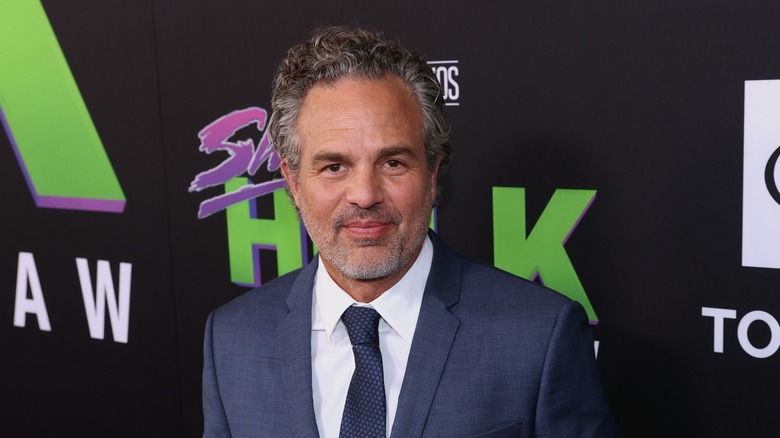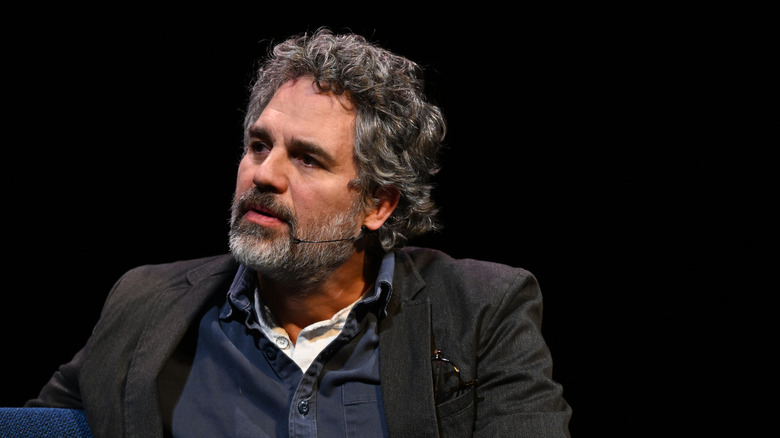Tragic Health Issues You Never Knew Mark Ruffalo Dealt With
Mark Ruffalo has had a number of memorable roles in his time in Hollywood. From working with Jennifer Garner in "13 Going On 30," which Ruffalo almost quit, in the early 2000s to starring opposite Emma Stone in the award-winning "Poor Things" in 2023, Ruffalo is perhaps best known for playing Bruce Banner/The Hulk in the Marvel Cinematic Universe. He's been nominated for an Oscar multiple times, and as of 2024, he has his own star on the Hollywood Walk of Fame. Despite his high profile, Ruffalo also seems to be one of Hollywood's more easygoing, unproblematic stars. Off-screen, he's been a long time environmental activist, and he co-founded The Solutions Project, which helps support climate justice work around the country. Pretty impressive!
However, as notable as his movie and activism work has been, his life hasn't always been smooth sailing. Like any of us, Ruffalo has had his share of hardship. And when it comes to health issues, Ruffalo has faced more problems than you might guess.
Mark Ruffalo had a brain tumor
On a January 2024 episode of the "SmartLess" podcast, Mark Ruffalo talked about having a brain tumor in the early 2000s. He first realized he had one (or might have one) after dreaming about it. "It wasn't even a voice," the actor said about his dream on "SmartLess." "It was just pure knowledge, 'You have a brain tumor, and you have to deal with it immediately.'" The timing was particularly bad because Ruffalo's wife, Sunrise Coigney, was pregnant with the first of their three kids. Not just pregnant, but due at any moment.
Ruffalo went to a doctor after his dream to see if it was a real premonition, and after looking at a scan, the nurse told him, "you have a mass behind your left ear the size of a golf ball." It turns out it was an acoustic neuroma, which, according to the Mayo Clinic, "is a noncancerous tumor that develops on the main nerve leading from the inner ear to the brain." He'd had an ear infection in his left ear before he had his diagnosis; perhaps that was a more subtle symptom compared to his dream. He didn't tell his wife about his condition right away; Ruffalo waited until after the baby was born and just before his surgery.
Mark Ruffalo's heart stopped during surgery
Any surgery carries with it a series of risks, and in rare cases, the anesthesia administered causes detrimental side effects, including brain damage and death in severe cases. Before he went under the knife for his acoustic neuroma, it sounds like Mark Ruffalo did have some concerns about the anesthesia. He's spoken about having had "a really bad reaction to the anesthesia" during an undisclosed surgery that he'd had before his brain operation, via YouTube. So it completely makes sense that he was nervous going into the surgery and hoping to make it through alive.
The tumor was removed in its entirety, so it could be deemed successful in that regard. However, that doesn't mean that everything went entirely smoothly. It turns out that Ruffalo's heart had stopped temporarily during the procedure. Obviously the surgeons were able to get his heart started again and finish their job, but that's still a terrifyingly close call.
Facial paralysis left Mark Ruffalo scared for his career
Mark Ruffalo was left with a scar and no hearing in his left ear. But that wasn't all that happened after the tumor was taken out. The surgery to remove the acoustic neuroma had a small but not insignificant chance of leaving him with facial paralysis since it was growing on the nerve that controlled facial muscles. So along with a fear of death during surgery, Mark Ruffalo said that he was scared that there would be an impact to his face, since facial expressions were such a part of how he made his living as an actor (via YouTube). After surgery, he found out that his fear about his face had come true: "I woke up and my face was paralyzed, and they didn't know if it was ever going to come back. And I couldn't even close my eye. I looked terrible," he told NPR.
He tried all sorts of methods to try and get the movement back into his face, explaining to The Guardian in 2005 that he tried, "energy healers, acupuncture, craniosacral therapy, everything, everything." Thankfully, however, the facial paralysis ended up going away within a year — that doesn't happen for all patients in his situation.
Ruffalo learned a lot from the entire experience. It "made me grateful," Ruffalo explained to NPR, "It made me compassionate. It made me aware of loss. It made me aware of how fragile life is."
Mark Ruffalo has something in common with his most famous character
Mark Ruffalo famously plays Bruce Banner/The Hulk in the Marvel Cinematic Universe, a character whose strength is powered by rage. Ruffalo had his own issues with anger management when he was a teenager. In an appearance at the 2023 Emerald City Comic-Con, Ruffalo revealed what he had in common with his MCU character. "That anger, that unexpressed anger, as nice as I might seem [...]. That's always been something that I've related to, especially when I was younger," he said, via YouTube. It was something that he said went back through his teen years and even before. That anger may have also been influenced by how he felt like bit of a misfit when he was in elementary school.
He said at Comic-Con that one reason for feeling anger when he was younger was always being told what to do because what he was doing wasn't the right thing, something he said lots of kids relate to. Some of that anger seems to have continued into his young adulthood. When he was starting out in acting, Ruffalo explained that his apartment decorating style was influenced by having to use posters to cover up holes in the wall from "my coffee mugs and fists," over being rejected from roles. As he's gotten older, he's been able to redirect that anger into working to make the world a better place as he advocates for environmental and social justice causes.
Depression is an ongoing issue for Mark Ruffalo
Mark Ruffalo has been open with his mental health issues over the years. Along with anger issues, he said that when he was younger, he was "undiagnosed with dyslexia, ADHD, and depression," via Child Mind Institute. His depression persisted, not helped by being a young actor who wasn't getting work. His life changed after a friend of his died by suicide in 1994. "The moment he left, I realised that death wasn't an escape, that suicide wasn't an answer," he explained to Parade.
That doesn't mean that Ruffalo flipped a switch in his brain and all his depression went away. Instead, as he told the Observer in 2015, he has "dysthymia. It's a long running, low-grade depression all the time. I've been struggling with that my whole life." Dysthymia may also be referred to as "persistent depressive disorder," according to John Hopkins Medicine. Thankfully, Ruffalo has found ways to help manage his mental health issues, and he's had the bravery to share his struggles with others.
